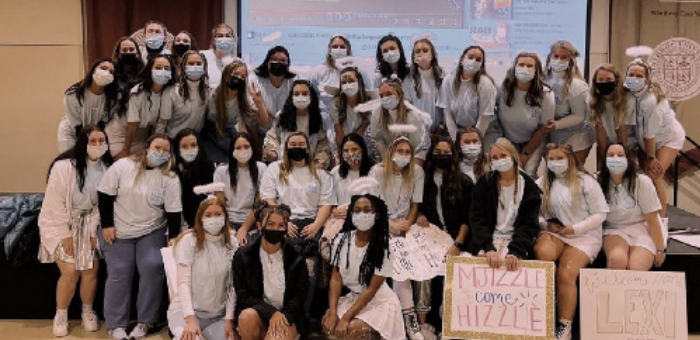The Delta Pi chapter of Sigma Sigma Sigma was suspended until February of 2025 for violating both the Winthrop University student code of conduct and the National College Panhellenic guidelines that govern all sororities.
The sorority faced charges of collusion, inappropriate purchase and consumption of alcohol, and hazing, according to Winthrop’s webpage.
The incidents that were reported occurred on March 5, 2020, and Oct. 28, 2021. The investigation was started on Jan. 24, 2022, and the sorority was formally charged on Jan. 27, 2022.
“Rules were broken by the organization, both National as well as University rules. Some of these include collusion, many alcohol violations, social events policies where hazing took place, health and safety policies, membership intake policies, as well as the rule of consent not being considered at all times,” said former Tri Sigma member and junior psychology major Chelsey Ingram.
Elizabeth Gibson, another former member and junior psychology and sociology major, concurred.
“The rules were constantly being broken. Alcohol was being provided to underaged members as well as underaged new members who were not even initiated at the time. While alcohol was provided to members, so was marijuana,” Gibson said.
The two former members who reported Tri Sigma also spoke out on the toxic and unhealthy culture of the sorority.
“Tri Sigma has a very toxic culture, and it is absolutely shown through the people that were involved in making others feel uncomfortable. Rumors would start about sisters who were called psychopaths or even deemed as pathological liars,” Gibson said.
Ingram concurred, saying that “the things said to members in many cases are so brutal and inhumane. I found myself being so uncomfortable around any and every previous sister because of the negativity, bullying, and belittling that was said about them.”
“Not only would there be nasty things spoken about their own sisters, but Tri Sigma was never afraid to make nasty songs about the other organizations and other girls on the campus. It was absolutely disgusting,” Gibson said.
The two also spoke about their experiences with hazing, with both saying that they had been hazed by more senior members of the sorority.
“When members of the chapter were repeatedly yelling ‘this is not hazing if you say yes,’ then as a non-initiated new member, I thought they were right and thought nothing of it. But when their pressure was applied as hard as it was, I, of course, was not going to be the one who said no for fear of being singled out,” Ingram said.
“Without going into deep details, there were a handful of events where I was forced to do activities that I did not want to do. Alcohol was included in said events, and even videos were captured, making it even worse. That was hazing,” Gibson said.
Due to some of the aspects of their sorority, both members’ mental health declined.
“These were the actions that took place within the chapter through its more prominent, louder–spoken members, the ones who established where your social status was within the chapter as well as influenced the rest,” Ingram said.
Ingram continued, saying that “they laid the foundation for a negative community that was built upon hatred towards one another and bonding through that hatred. This would send me into the deepest mental discomfort I have ever experienced because they contributed to me doing things that I knew did not align with the person I am.”
Due to these reports, the decision was made to suspend the sorority from Winthrop’s campus for three years.
“Cases of organizational misconduct are handled and resolved in accordance with the procedures listed in the Student Conduct Code. The purpose of these policies and procedures is to cultivate learning, encourage accountability and responsible decision making and prevent the occurrence and recurrence of harmful behaviors,” said Interim Dean of Students Anthony Davis.
Possible Title IX rumors were addressed and were deemed to be false.
“All of Greek life is not bad and does not give experiences like the ones I had but instead give the best experiences,” Gibson said. “Tri Sigma does not represent a good sisterhood or honest faces, but instead they represent what not to do. Tri Sigma needed to be taken off campus, and honestly, I should have reported it way sooner.”




